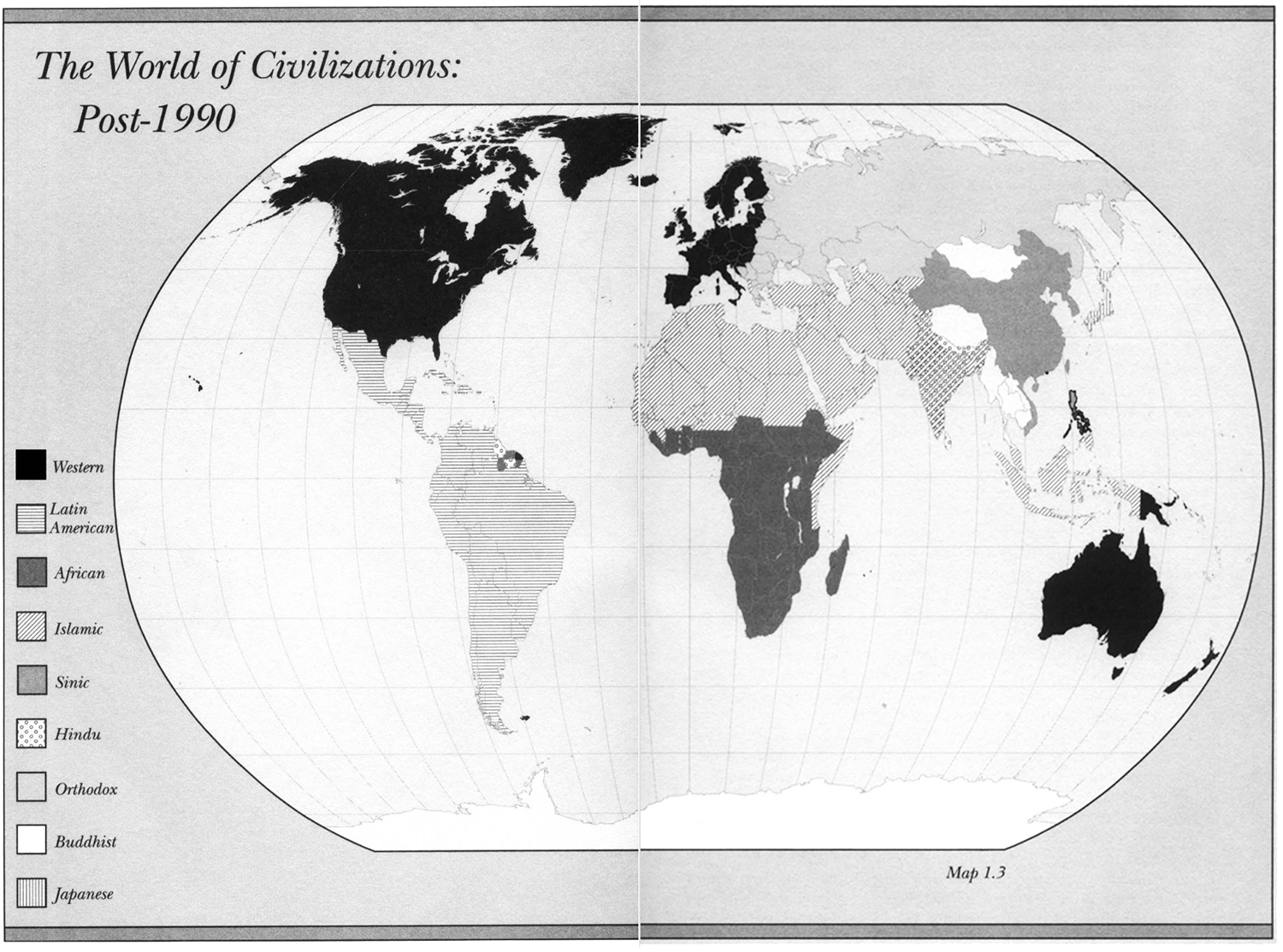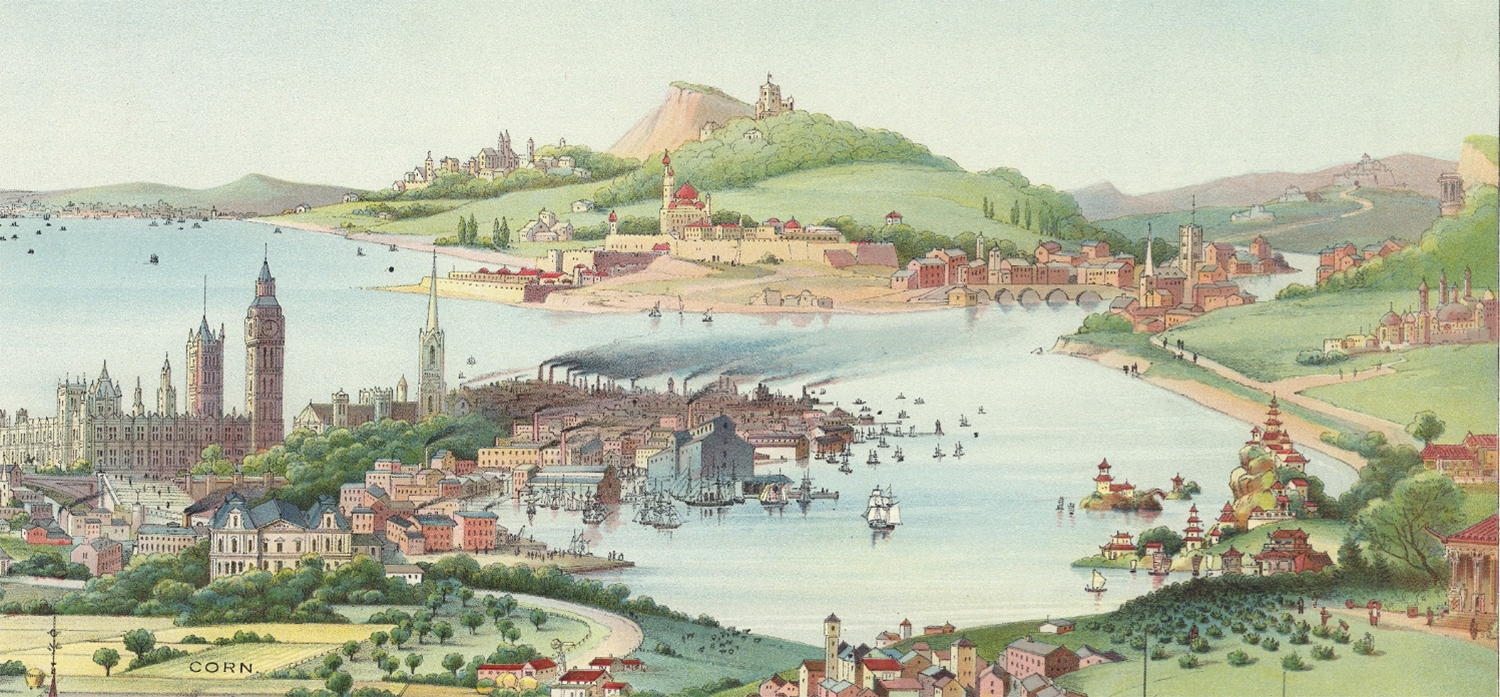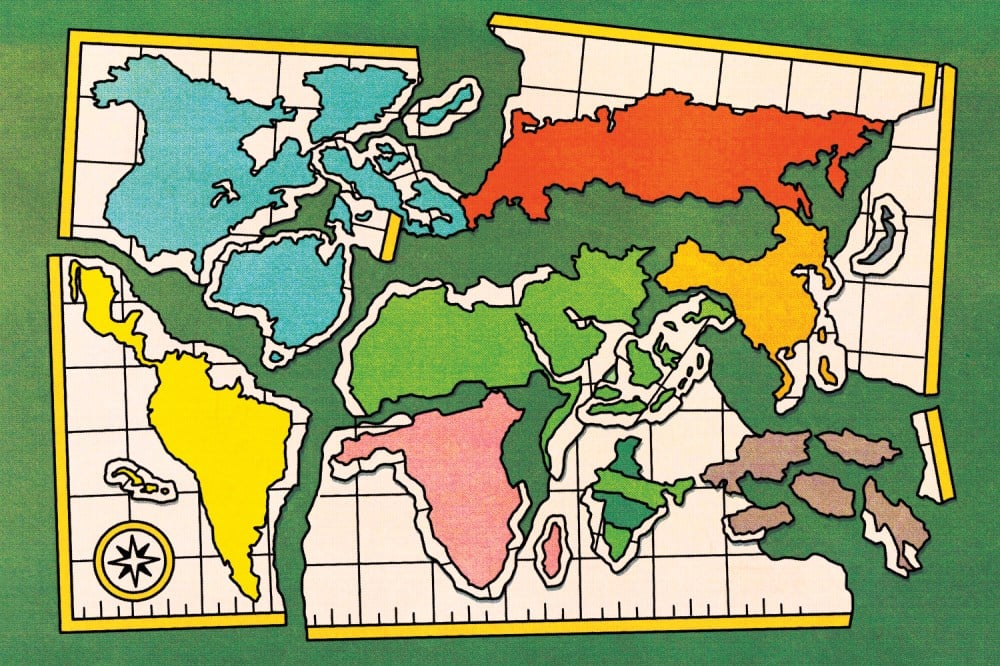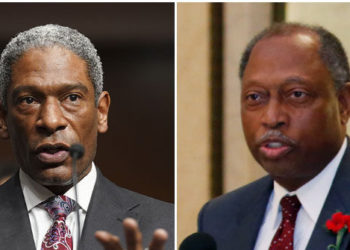Since its publication in 1996, Samuel Huntington’s The Clash of Civilizations and the Remaking of the World Order has been globally influential, cited by leaders from Washington to Beijing. Huntington’s thesis is that geopolitical conflicts will increasingly take place between what he defines as the world’s major civilizations, a mixture of cultural, religious, and racial categories. As critics have noted, this is nonsense.
Huntington’s ideas have been savaged and mocked by those who insist his concept of civilization is too incoherent, confused or “mushy” to meaningfully explain the fault lines of global conflict. But then maybe that’s the point.
It’s not just that such major recent conflicts as the Syrian civil war and the Russian invasion of Ukraine have taken place within rather than between Huntington’s civilizational categories. The categories themselves are all over the map. Some civilizations, like Islamic and Hindu, are broad religious identities, while Orthodoxy (as a subset of Christianity) is elevated to an identity of its own. East Asia, in turn, is uneasily divided between Sinic, Buddhist, and simply Japanese—a byproduct of the book being composed in the early 1990s, when Japan was widely perceived as a rising superpower.

Finally, the broad designation of “African” purports to be a crude geographic category while also invoking an even cruder racial one. As political scientist Anjali Dayal notes, Huntington’s civilizations are a bit like Borges’s imaginary division of animals in a fictional Chinese encyclopedia: “(a) belonging to the emperor, (b) embalmed, (c) tame, (d) sucking pigs … (k) drawn with a very fine camelhair brush, (l) et cetera…”
Unfortunately, in the wrong hands, an incoherent idea can be a powerful one. The very mushiness of Huntington’s divisions makes it perfect as a rhetorical device for framing conflicts in ways that serve political ends. Human cultures are complex and ever-changing, made up of an infinite array of overlapping religious, artistic, linguistic, historic, and ideological affiliations.
Civilizational rhetoric gives pundits and politicians the flexibility they need to cut up and refashion this fabric in whatever way best fits their agenda. One day Russia is a Slavic state challenging the West; the next, Vladimir Putin is guarding Christian civilization against its many foes. In the West, racialized fears were recast as ideological ones, then reframed again in Huntington’s post-Cold War world as civilizational divides. The Yellow Peril became Red China which in turn became the “Sinic” world. If in an earlier era, we were always at war with East Asia, now East Asia has always been our civilizational foe.
The malleability of civilizational rhetoric brings other benefits. It has sustained a coalition committed to defending “Western civilization” that unites those who see the West as fundamentally secular and those that see the West as fundamentally Christian, while also providing cover for those who see the West as fundamentally white.
And this same malleability has helped countries like Russia, China, India, and Turkey take their nationalism up a notch by rebranding themselves as “civilizational states.”
The ambiguity of civilization begins with the evolution of the word itself. At first, it usually referred to a universal standard of sophistication that could be applied both to others societies and to lower-class members of your own. But in time, civilization came to denote a discrete cultural unit with its own distinct traditions or values. This version, captured most famously in the game Civilization, nominally presented diverse cultures as potentially equal.
Yet the concept never quite escaped the sense of hierarchy. Those who talk in terms of civilizations almost always assume that theirs is the more morally or technologically advanced—while others can be ranked according to their wealth or geopolitical power. Many people also assume that, as in the game, all civilizations will ultimately follow the path pioneered by the West, even if the scripts or architectural motifs may differ.

Inevitably, some civilizations are more civilized than others. Consider this elegant illustration from an 1893 classroom geography chart. A civilization may build with spires, or perhaps with pagodas or onion domes. But the ones with the spires are in the foreground, and they seem to have all the factories.
This built in chauvinism makes it easy to move between different versions of your civilization while still remaining supremely confident in your superiority. Putin, among others, has done this particularly well. While Putin has most notoriously appealed to the idea of Russian civilization to justify the invasion of Ukraine, this is just one of the many civilizational permutations at his disposal. There’s also Russia as the defender of Orthodox civilization, emphasized in Moscow’s outreach to Greece, and Russia as the defender of Slavic civilization, a staple of Russian appeals to Serbia.
Of course, Putin’s ambitions extend beyond these more limited civilizational identities. As has been widely documented, Russia has made inroads with right-wing and evangelical movements in Europe and the United States by invoking a shared Christian civilizational identity. As he reportedly put it in 2013: “We see many of the Euro-Atlantic countries are actually rejecting their roots, including the Christian values that constitute the basis of Western civilization. They are denying the moral principles and all traditional identities: national, cultural, religious, and even sexual.”
And lest Muslims feel left out, Russia’s civilizational rhetoric has something for them too. While defending the Christian roots of western civilization in the West, Russian diplomats have appealed to a shared Eurasian identity in Turkey. The cultural and historical basis of Eurasian values can be vague—something about the steppe and a strong state—but it finds its footing in a shared hostility toward Western hegemony.
Turkey is another country that has embraced the contradictory possibilities of civilizational rhetoric. As the self-proclaimed heir to Ottoman civilization, Turkey can simultaneously offer a more inclusive face to the world while doubling down on ethnic and religious nationalism at home. In the aftermath of 9/11, for example Turkey and Spain teamed up to launch the Alliance of Civilizations, where they celebrated the interfaith legacy of Al-Andalus and the Ottomans without ever quite mentioning the catastrophic sectarian violence of 1492 or 1915.
In a similar vein, Istanbul applied to be a 2010 European Capital of Culture with a slick video featuring a rich array of historic churches, synagogues, and mosques. Then, after winning, Recep Tayyip Erdogan’s government took the accompanying grant money and spent it on restoring the mosques alone.
These opportunistic reframings aren’t entirely new. Historical empires often defined themselves in multiple fashions. The Qing Empire could simultaneously position itself as the heir to the legacy of Genghis Khan, as a Buddhist monarchy led by a “wheel-turning king” to Southeast Asians, and as the inheritors of Confucian tradition in China itself. The Ottomans also claimed the Central Asia title of “khan,” in addition to the Islamic “caliph” and the “Caesar of Rome.” Now, the civilizational version of this game extends beyond the rulers themselves to cast the whole nation in terms of whichever identity is most powerful—or useful—at the time.
Indeed, for all the hype about the rise of the civilizational state, the term tends to be used by those who are promoting a more exclusive form of nationalism. For example, ruling Bharatiya Janata Party leaders proclaiming India a “civilizational state” are not seeking to celebrate the rich array of religious and linguistic influences that contribute to modern Indian culture. On the contrary, they are seeking to deliberately exclude that diversity in favor of Hindu supremacy.
In Europe and the United States, the idea of “Western civilization” has helped weld together rival forms of cultural chauvinism. Under this banner, New Atheists who condemn Muslim integration as a threat to Enlightenment secularism can join ranks with Christian fundamentalists who see Muslim immigration as a new front in the Crusades. If you’re not particularly invested in the actual history of the Enlightenment or Christianity, you can try to square the circle by suggesting that Christianity was always uniquely secular. Alternatively, if your real goal is to talk about white people without actually saying so, you can fall back on the dog-whistle version of “Western civilization” that former Rep. Steve King had in mind when he tweeted, “We can’t restore our civilization with somebody else’s babies.”
Ultimately, civilizational rhetoric offers a new form of ethnic nationalism for countries where openly embracing it carries historical complications: the United States with its melting pot ideology; European Union states with their rival nationalisms; Russia and China with their Communist-inspired multi-national state structures; India with its diverse post-colonial inheritance; and even Turkey, where nationalism was traditionally secular. Now, under the rubric of civilization, nationalists in all these lands can celebrate their preferred linguistic, religious, and cultural identities without apology.
For its most committed advocates, “Western civilization” can mean a lot of things, but seldom does it mean “Western democracy.” Indeed, in all of these countries, the concept of civilization has been embraced most eagerly by those explicitly rejecting inclusive democracy. The term itself, a little anachronist, a little hierarchical, stands in opposition to the universal aspirations of 20th century liberalism. Instead, it offers a nationally specific gloss on a surprisingly replicable model of authoritarianism.
In this sense, mapping Huntington’s civilizational categories or quibbling about their incoherence misses the point. From a civilizational perspective, where you draw the lines is less important than the very act of drawing them. The chauvinism is the point.
The post How to Sell a Clash of Civilizations appeared first on Foreign Policy.




